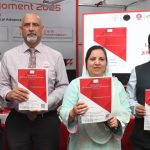New Delhi, Sep 25: “IAS officers joining service today are blessed with the privilege of being the architects of India@2047 when the nation celebrates 100 years of independence,” said Dr Jitendra Singh, Union Minister of State (Independent Charge) Science & Technology, MoS PMO, Personnel, Public Grievances, Pensions, Atomic Energy and Space.
Addressing the 2021 batch of IAS officers undergoing the 2-month stint as Assistant Secretaries in the Government of India, Dr Jitendra Singh said, “You will be witness to India’s ascent to that pedestal which is being envisaged for 2047 when Independent India turns 100. And you will be at the prime of your career, many of you holding senior positions and you will have the opportunity to celebrate the 100th Anniversary also.”
Dr Singh said most programmes in the government headed by PM Narendra Modi are technology driven such as the PM Gati Shakti and Svamitva schemes. In order to make the government citizen-centric and achieve good governance, it is important that the civil servants are well versed in using emerging technologies, including Artificial Intelligence, he said.
“Prime Minister Narendra Modi has stressed that we cannot afford to work in the silos that had held us back for a long time. Today it is an all-encompassing, all-enveloping, all-inclusive and all-participating march toward development,” he said.
The DoPT Minister said the vision for India@2047 for a ‘future ready India’ includes a competency framework for the Civil Services under Mission Karmayogi which envisages preparing civil servants for the future by making them more constructive, enabling, energetic, innovative, proactive, professional, progressive, transparent and technology-enabled.
The union minister said the initiative of a mandatory stint of Assistant Secretaries with the Central Ministries / Departments is a novel experiment introduced at the behest of Prime Minister Narendra Modi in 2015.
Dr Jitendra said that the DoPT is successfully implementing the attachment of young IAS officers to the Central Government right at the beginning of their careers. “This exposure helps them to acquire a national perspective and appreciation of diversities in national policies. This also sensitizes them to the larger perspective of policies and programmes of Government of India,” he said.
The minister was informed that this batch of 182 officers comprises 61 women and 121 men. The majority of them (122) come with an engineering background, followed by 20 with an Arts stream, 13 with Pure Sciences and 9 with a Medical background.
Dr Jitendra Singh expressed the hope that the technocrats and the officers with diverse educational qualifications will be able to do justice to the flagship programmes of the government in sectors like Health, Agriculture, Sanitation, Education, Skills and Mobility to name a few, which are technology-based and technology-driven.








